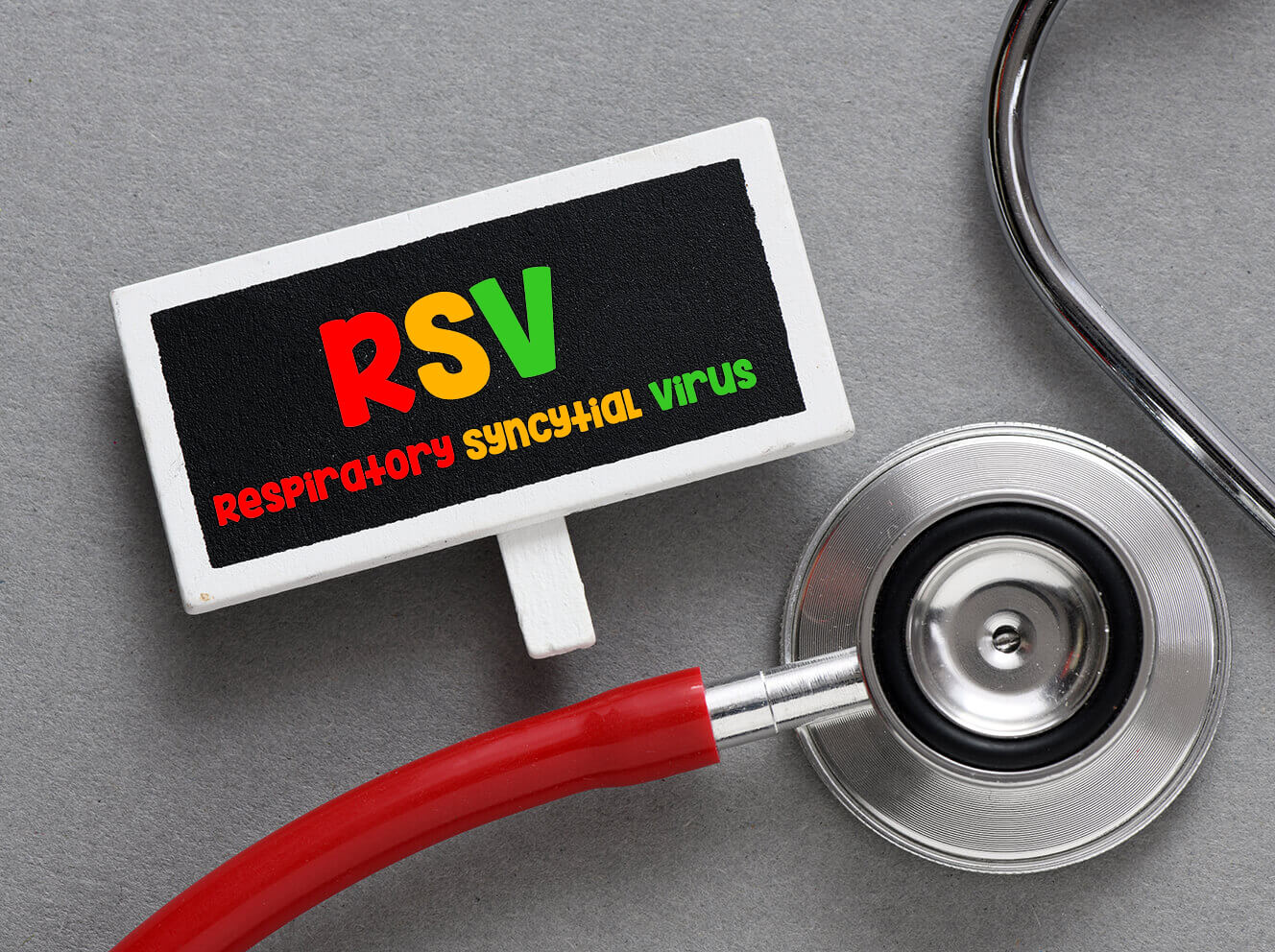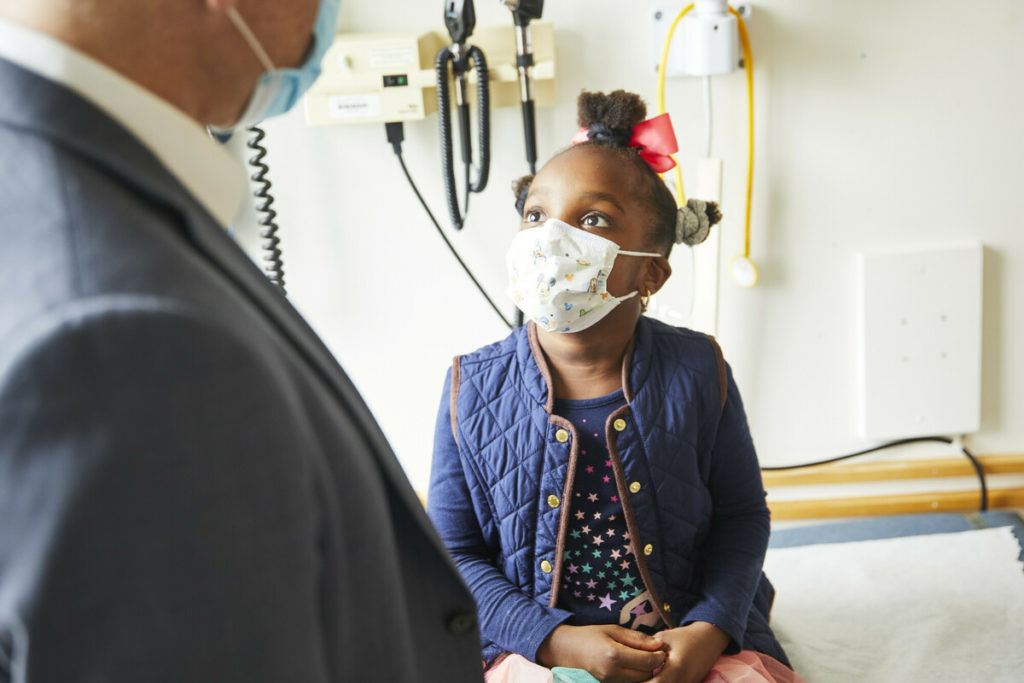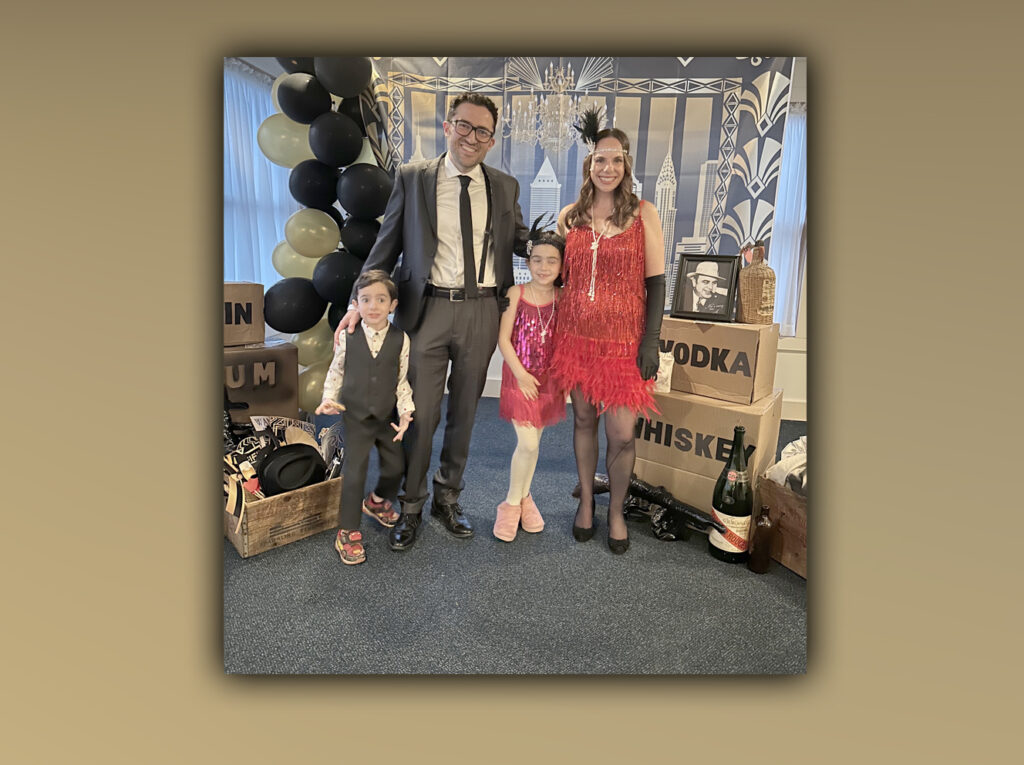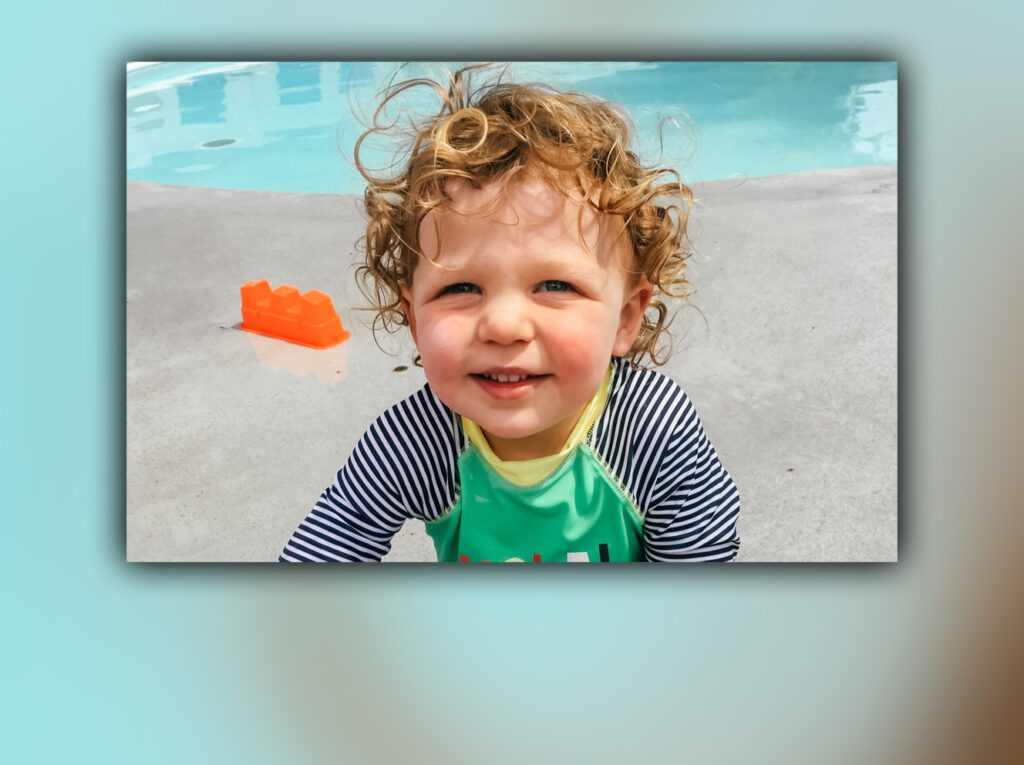Key Takeaways
1. What is respiratory syncytial virus (RSV)?
Respiratory syncytial virus (RSV) is a common illness that affects the airways (nose, throat and lungs). In older children and teenagers, RSV can be mild and causes cold-like symptoms. In babies and children under age 5, though RSV can be mild, it can also be very serious. RSV can cause bronchiolitis (inflammation of the lower airways and lungs). RSV is typically most common in the fall and winter months, but doctors have seen cases during other times of the year.
2. Who is more likely to develop severe RSV?
The following groups are more likely to develop severe cases of RSV:
- Premature babies
- Very young babies, especially those age 6 months or younger
- Children under age 2 years with chronic (long-term) lung conditions or congenital heart disease (heart disease that is present at birth)
- Children with weakened immune systems (system in the body that helps fight germs and illness)
- Children with neuromuscular disorders (disorders that affect how the nervous system and muscles work together), including children who have trouble swallowing or clearing mucus (thick, sticky liquid that lines the lungs, throat, mouth and nose) on their own
3. How is RSV spread?
RSV is spread in the following ways:
- If a person with RSV coughs, sneezes or blows their nose near you
- Touching, kissing or shaking hands with someone who has RSV
- Touching shared surfaces or objects also touched by someone with RSV, such as a doorknob or toys
RSV can spread quickly through enclosed, shared spaces, such as day care centers, schools or crowded households.
4. What are the symptoms of RSV in children?
Symptoms of RSV depend on your child’s age. Symptoms usually appear 2-8 days after being exposed to RSV.
- Birth – 6 months
- Apnea (pauses in breathing)
- Decreased appetite or poor feeding, leading to fewer wet diapers and dehydration
- Decreased activity levels (not as active as usual)
- Fussiness or irritability
- Trouble breathing or working hard to breathe
- Visible chest retractions (when the chest appears to sink in just below the neck or breastbone with each breath)
- Breathing very quickly
- Shortness of breath
- Nasal flaring (when the edges of the nostrils flare outward when your baby breathes out)
- Wheezing (a whistling sound when breathing)
- In severe cases, cyanosis (bluish color in the skin caused by lack of oxygen)
- 6 months – 5 years
- Trouble breathing or working hard to breathe
- Breathing very quickly
- Shortness of breath
- Nasal flaring (when the edges of the nostrils flare outward when your baby breathes out)
- Wheezing (a whistling sound when breathing)
- Low-grade fever (fever between 100.4°F-102.2°F/38°C-39°C)
- In severe cases, cyanosis (bluish color in the skin caused by lack of oxygen)
- Age 5 years and older
- Cold-like symptoms, such as stuffy nose, low-grade fever (fever between 100.4°F-102.2°F/38°C-39°C) or barking cough (a cough that sounds like a seal barking)
5. How do doctors diagnose RSV in children?
Most cases of RSV go away on their own in 1-2 weeks. If your child needs treatment for RSV, your pediatrician and their team will help figure out which treatments can help.
6. How is RSV treated?
Treatment for RSV may include:
- Acetaminophen (Tylenol®) or Ibuprofen (Motrin® or Advil®) to reduce fever (Ibuprofen should only be used for infants over 6 months)
- Fluids to keep your child hydrated
- Nasal saline (sterile saltwater solution used in the nose) and/or suction to help with congestion
- Humidifier or shower steam to help with congestion
- In children and babies 12 months or older, honey to help with cough (consult your physician first)
- In severe cases, hospitalization (especially for babies age 6 months or younger or for children who are having trouble breathing)
Antibiotics and bronchodilators (medications that help widen the airways in the lungs) do not help most children with RSV. If your baby/child has asthma, however, your care team may prescribe a bronchodilator to help with their breathing while they recover from RSV. Doctors typically do not recommend over-the-counter (purchase without a prescription) cough and cold medications for young children.
7. What are possible complications of RSV in children?
Possible complications (medical concerns that occur during a disease or after a procedure or treatment) of RSV are most common in babies age 12 months and younger. Complications may include:
- Dehydration (low levels of fluids caused by not drinking enough fluid or losing more fluid than your child takes in)
- Bronchiolitis (inflammation of the bronchioles, or the small airways in the lungs)
- Pneumonia (an infection that causes inflammation of the air sacs, or pouches, that surround and protect the lungs)
- Lung failure (a condition in which the lungs cannot pass enough oxygen through the blood, which makes it hard to breathe)
8. When should I call the doctor?
If your baby has trouble breathing, call 911 or go to the closest emergency room.
Call the doctor if your child shows any of the following symptoms:
- If your baby/child’s symptoms get worse or do not get better after a few days
- Trouble breathing
- Shortness of breath
- High fever
- Bluish color to the skin
You can also call the doctor if you’re concerned about your baby/child’s risk of RSV or RSV symptoms.
9. How can I prevent RSV?
- Wash your hands often with soap and warm water; scrub your hands with soap for at least 20 seconds before rinsing; if soap and water are not available, use alcohol-based hand sanitizer
- Keep your hands away from your face, nose and mouth
- Cover coughs and sneezes with a tissue or the inside of your elbow; wash your hands after you cough or sneeze and throw the used tissue in the trash
- Clean high-touch surfaces (surfaces that are touched often and by multiple people), including doorknobs, counters and toys
- Avoid close contact with anyone who has RSV or another illness
- Limit time spent in crowded or shared spaces, such as day care, grocery shopping or indoor shopping areas
- If possible, stay home if you or your child are sick
- Do an at-home COVID test; if your baby/child tests positive for COVID, the isolation practices are different from the tips used to prevent and treat RSV
These tips will help prevent any respiratory illness, not just RSV. These prevention tips are good practice for the entire family.
10. What is palivizumab and who can receive it to prevent RSV?
Palivizumab (Synagis®) is a medication used to lessen the chance of babies and children developing severe RSV. It can also help prevent serious complications (medical concerns that occur during diagnosis or after a procedure or treatment) from RSV. It is typically given as an injection every month between November and April when RSV is more common. It is not a vaccine and does not provide longer-term protection from RSV. Palivizumab does not treat RSV.
Palivizumab is reserved for babies under 6 months of age and children who are at high risk of developing severe RSV. This includes babies and children with any of the following:
- Chronic lung conditions
- Congenital heart and/or lung conditions
- Weakened immune system
- Down syndrome
Rev. 11/2022. Mass General for Children and Massachusetts General Hospital do not endorse any of the brands listed above. This article is intended to provide health information so that you can be better informed. It is not a substitute for medical advice and should not be used to treat any medical conditions.
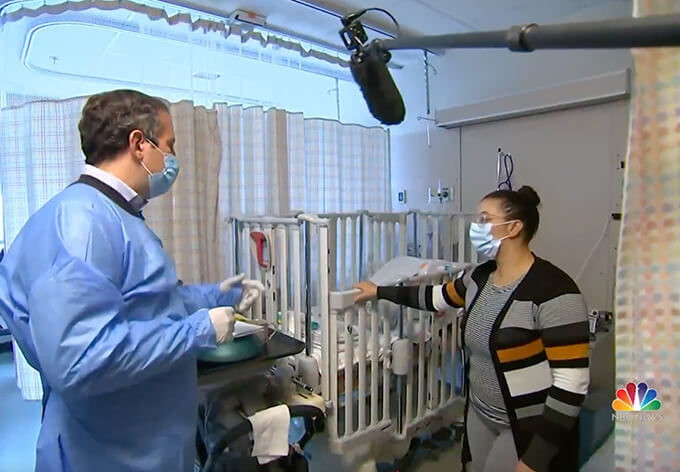
MGfC on NBC Nightly News
This week, NBC News’ Gabe Gutierrez visited Mass General for Children to get a closer look at the RSV crisis.
